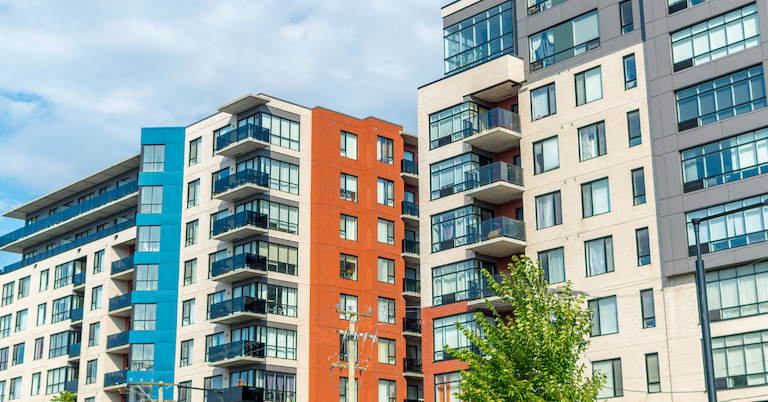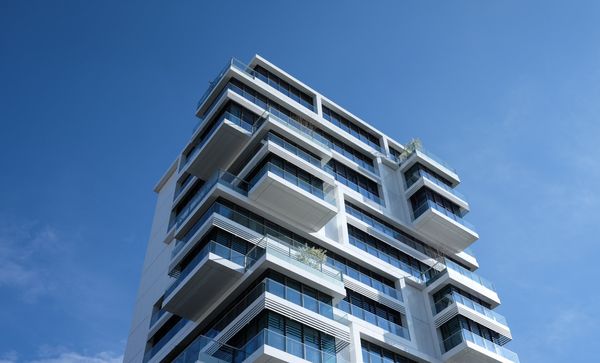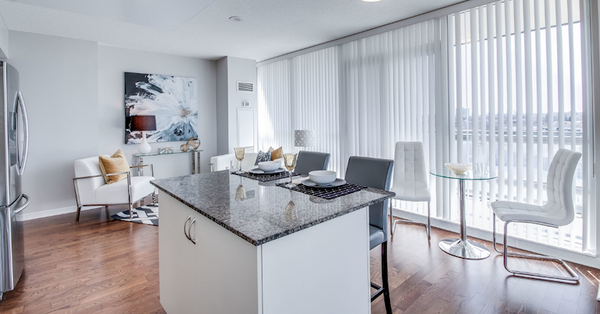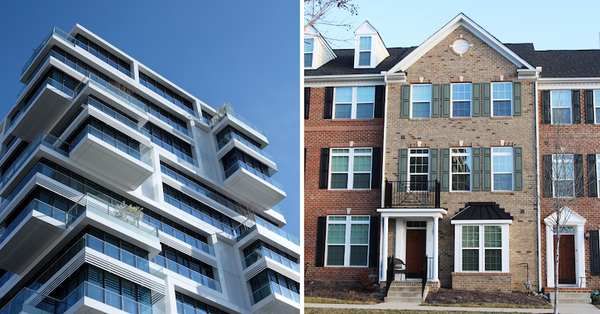Condos and apartments have several distinct differences. While both are types of homes typically located in multi-family complexes, the two have several benefits when it comes to renting or owning.
If you are thinking about buying a condo, it's smart to appreciate the differences before deciding where to live. Here's some background on each type of home to give you some insight on which might be the best option for you.
What's the Difference between Apartment and Condo
Condo ownership vs Apartment rental
One of the main differences between an apartment and a condo is how it's owned. Except for in the Manhattan/Brooklyn areas of New York, "apartments" throughout the rest of the US are generally rented, not owned.
Most condos are considered to be attached homes, which means that you will typically be connected to at least one adjoining unit. In other words, you may own one single unit in a 4 unit building or a 50 unit building. Each unit in a condo has a separate owner, but many of the common areas within the complex are shared between all the homeowners.
In most cases, you’ll buy a condo, own your unit and everything inside, but you will pay monthly HOA fees for things such as building maintenance and utilities. These are among the things you should know before buying a condo.
When considering a condo or an apartment, it's really an exercise of determining whether it's best to rent or own.
As a renter, you of course do not own any part of the building which means you will always have to request permission before making changes to it. This includes painting the interior or exterior. That could be a deal-breaker for some. However, if you are looking for a cheaper place to live and can compromise on personalizing your space, this is. good option.
Condo Vs. Apartment Maintenance
Another thing that differentiates a condo from an apartment is its maintenance.
If you live in an apartment, the building will be managed by a property manager who will care for everything inside your unit and in the common areas. However, if you live in a condo, you will have to handle things independently. Everything outside your unit will still go through condominium management (e.g., snow removal, landscaping), but the inside of your condo will be up to you.
Condo Vs. Apartment Amenities
There's usually not much of a difference between the amenities within a condominium and those within an apartment. Most condos/apartments will have the basics - e.g., kitchen, bathroom, appliances. There are also outside amenities such as swimming pools, parks, green space, parking areas, etc. Be sure to ask your realtor which amenities are included in the building you're interested in and how much they cost if there is a condo fee.
Advantages and Disadvantages of a Condo
When it comes to buying a condo, there are advantages and disadvantages to expect. Here are some of them.
Condo Advantages
Convenience: Condominiums are designed to have everything you need for your daily living right at the building. This includes a grocery store, shops, dry cleaning service, etc. You don't have to worry about going outside as much as if you were living in an apartment. You can find the best condos that feature even a restaurant, a park, and a gym.
Affordability: Condos are usually cheaper than houses because of the size. Although the size is small, it doesn't mean they're not spacious enough to fit your needs. Do some research before purchasing a condo so you can determine if it's worth what you want to spend on it.
Maintenance: When it comes to maintenance, condos are usually taken care of by the homeowner association (HOA). If there is a condo board in place, it will determine how to maintain and promote the condos. You'll also be responsible for any repairs that need to be done within your unit.
Condo Disadvantages
Closing Costs & Downpayment: This is more of a general downside of buying any home, condo or house. You'll need to save up enough money for a down payment, unless you're a veteran and can access a VA loan. Most first-time homebuyers put 3-5% down on their home.
Plus, you'll have to have enough cash to cover the closing costs when you buy your condo. We've created a detailed list of buyer closing costs, but in general, closing costs will add up to about 2-3% of the purchase price of the condo.
HOA Dues: Owning a condo doesn't mean you don't have to pay for anything else. There are still fees in place such as HOA dues that you have to cover. There are also monthly or yearly condo fees for the upkeep of the common areas, exterior maintenance, and other amenities. The HOA board usually sets these fees, so they can vary from building to building.
Advantages and Disadvantages of an Apartment
Living in an apartment also comes with its set of pros and cons, as outlined below:
Advantages
Flexibility: The apartment offers flexibility in terms of relocation. Because you don't own the house, you can always find another one if you are not happy with your current location. This is especially the case when you rent a house or apartment in a high-demand neighborhood.
Affordability: The cost of renting an apartment is lower than owning a home because it's taken care of by the landlord who does not charge for future repairs and improvements. This makes an apartment preferred by many people.
Lifestyle: The apartment is not a permanent living arrangement but a short-term home that allows you to enjoy a particular lifestyle. It could be the lifestyle of an upscale suburb or near a major city where cultural and entertainment activities abound. If you are not ready to commit to purchasing a home or condo, renting an apartment is a great way to enjoy a certain location and/or lifestyle for a period of time.
Disadvantages
Location: Even when you have options about where to live, apartments are usually located in one area. Sometimes these areas can be too crowded. You'll have to deal with noise and congestion, and the constant traffic may be a problem for some people.
Parking: If you're in an apartment building that has no parking or very little of it available to tenants, you could find yourself having to park away from where you live. The parking menace can be a problem, especially in the evenings when people return home from work.
Landlord Rules: You may have to abide by specific rules established by your landlord, which you don't have in a condo. There might be restrictions on pets in an apartment building, for example. And depending on where you are in the country, there can be strict laws about how long a car can sit parked on the street or in a driveway before it is considered abandoned and towed.
Bottom Line: Which One Should You Choose?
Both apartments and condos are good options for those seeking a smaller living space with plenty of amenities. personal Depending on your needs, you might want to choose one or the other.
If you're looking into buying a condo or finding an apartment to rent, our team at SimpleShowing can help. Get in touch with us, and we will help you find a space that exceeds what you are looking for in a location you want to live in.




